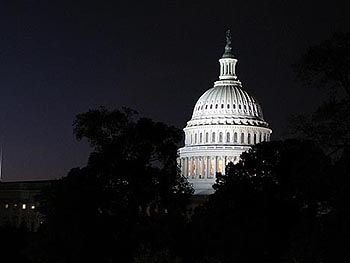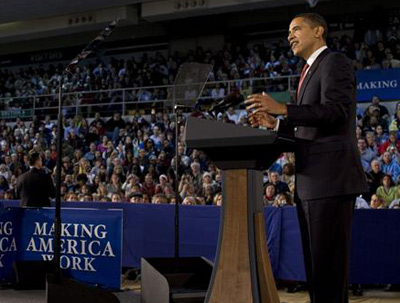
Photo by flickr user <a href="http://www.flickr.com/photos/unfocusedbrain/2214125181/">BlankBlankBlank</a> used under a <a href="http://www.creativecommons.org">Creative Commons</a> license.
Barack Obama plans to partially pay for his healthcare program by reining in Medicare costs. Megan McArdle thinks that’s a problem:
To my mind perhaps the most worrisome part is that anything Obama does to “pay” for this program is something that cannot be done to “pay” for our growing Medicare problem. Slashing provider reimbursements, Medicare advantage, etc, if it is done, is something that should be done in order to close the projected 3.4% budget gap in 2019. Once we’ve used them for new entitlements, we are less able to pay for the entitlements we’ve already got.
In other words, if we cut reimbursements as a way of offsetting the cost of Obama’s universal healthcare, we can’t later cut reimbursements as a way of reducing Medicare costs and reining in the looming Medicare deficit. The money is already gone. So what will we do instead?
The answer is obvious: we’ll eventually raise taxes. Or, more accurately, we’ll raise taxes more than we otherwise would, since tax increases of some size are now inevitable regardless of what we do. This is part of the price we’re paying for the tactical decision Republicans have made to oppose every Democratic program sight unseen.
Step back for a moment and you’ll see why. Bipartisanship is in bad odor these days because it’s associated with a knee-jerk, David Broderish tendency to assume that the answer to any policy dilemma is automatically halfway between the liberal position and the conservative position. But that sells bipartisanship short. Where it shines is its ability to allow politicians to make tough decisions.
If all you want to do is hand out goodies — tax cuts, prescription drugs, defense contracts — life is easy. Everyone loves goodies. You don’t need help from your opposite numbers to get stuff like that through Congress.
But what if you want to pass something tougher? Something that takes as well as gives? If you have bipartisan support, you can do it right: you can stand up to special interests and K Street lobbyists and enact real reform. But you can only do this if you have political cover and plenty of votes. If, instead, you have to do it in the face of implacable partisan opposition, then you can’t afford to make any more enemies. Every vote is precious, and that means instead of standing up to special interests, you have to buy them off. All of them.
Take healthcare reform. Republicans used to be in favor of reining in Medicare costs, which normally means that this would be a fertile area for bipartisan cooperation. But the Republican Party has decided in  recent weeks that its short-term political interests dictate unbending opposition to everything healthcare related. So suddenly they’re Medicare’s biggest defender, screaming about euthanasia and death panels and brigades of bureaucrats getting between seniors and their healthcare. As a result, no Democrat in his right mind will seriously touch Medicare. Instead, special interests are bribed to cooperate, Medicare is left largely untouched, and the can is kicked down the road.
recent weeks that its short-term political interests dictate unbending opposition to everything healthcare related. So suddenly they’re Medicare’s biggest defender, screaming about euthanasia and death panels and brigades of bureaucrats getting between seniors and their healthcare. As a result, no Democrat in his right mind will seriously touch Medicare. Instead, special interests are bribed to cooperate, Medicare is left largely untouched, and the can is kicked down the road.
The same thing has happened with the climate change bill. Historically, Democrats were the party of command-and-control: if you want to regulate emissions, just pass a law telling everyone how much they’re allowed to emit. Done deal. It was conservatives who first introduced the idea of cap-and-trade, which uses market mechanisms to reduce emissions more cheaply and efficiently than command-and-control. Democrats were initially skeptical, but after it turned out to work pretty well on acid rain they decided to throw in their lot with conservatives like John McCain and Newt Gingrich — who until recently were supporters of a cap-and-trade approach to greenhouse gas emissions.
But no longer. Republicans have decided to unanimously oppose cap-and-trade, and that’s left Democrats with no choice but to buy off every special interest on the planet. The Waxman-Markey climate bill has turned into an orgy of dealmaking and logrolling because that’s the only way to get anything done when the loss of even a few votes is enough to sink your whole bill.
When you have bipartisan support, though, you can afford to make tougher decisions. That’s how Social Security got rescued in 1984. It’s how tax reform was passed in 1986. It’s how welfare reform was passed in 1996.
Now, you can decry this all you want. Maybe Democrats ought to stand up for their principles no matter what the cost. Death before dishonor. Etc. But that’s not the way life works, or ever has worked. If you want healthcare reform that really tackles costs, you need bipartisan support for pissing off the people who are going to lose either money or services from the deal. If you want a fair and straightforward cap-and-trade bill, you need bipartisan support to keep the special interests at bay. If you don’t get it, then you’ve got no choice but to watch your flanks like a hawk and ensure that you do nothing that can be used against you at election time. And the can is kicked down the road.
That’s the price we’re all paying for the Republican decision to be the Party of No. Instead of difficult decisions on healthcare costs, we get mostly smoke and mirrors. Instead of serious reductions in greenhouse gases at the least possible cost, we get a porkfest. It’s irresponsible and feckless, but until Republicans are made to pay some kind of price for it, it’s not likely to change.












